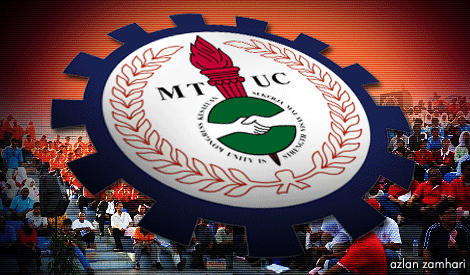Malaysian
Trade Union Congress (MTUC) is most concerned about the serious implication of Investor
State Dispute Settlement (ISDS) clauses and provisions in the Trans-Pacific
Partnership Agreement (TPPA) and other such agreements and treaties that
Malaysia signs. There is a serious concern that once Malaysia is bound by such
ISDS clauses, any foreign investor will have the ability to prevent Malaysia
from improving the rights and conditions of workers in Malaysia.
On
28th March 2015, it was reported that the government had agreed to
the Investor-State Dispute Settlement (ISDS) system.(Malaysian Insider,28/3/2015, Putrajaya okay with investor-state
dispute clause in trade pact, says DAP lawmaker)
The
ISDS clause empowers foreign investors, which also includes shareholders, to
commence legal action against Malaysia if it does anything, even by law or
policy, that will result in business having to expend more monies or has an
effect on its profits.
The
government must guarantee workers that signing agreements with ISDS clauses
will not result in a stagnation of Malaysian minimum wage rates. The worry is
that some foreign investor may take Malaysia to court in reliance of an ISDS
clause if the government increases minimum wages. This is exactly what happened
when the Veolia group, a French multinational, sued the Egyptian government
because of a rise in the monthly minimum wage. That company used the ISDS
provisions in an investment treaty between France and Egypt.
Will
laws and policies in the future that will require employer to make higher
contributions to employment provident funds, social security or some retirement
scheme result in some foreign investor taking action against Malaysia in
reliance of these ISDS clauses? Will the same also happen if Malaysia requires
employers to improve the standard of safety and health in the workplace –
providing better protection for workmen? Will Malaysia be able to in the future
pass a law requiring private sector employers to also pay Cost of Living
Allowances (COLA) to workers just like what public sector workers are getting
now?
MTUC
have been struggling so that workers in Malaysia, save migrant workers, would
be able to enjoy secure regular employment until retirement, and that all forms
of precarious employment like short term contractual employment and the
contractor for labour system be abolished. Regular employment is essential for
the long term security, welfare and wellbeing of the worker and their families.
Now, with the ISDS clauses in place, MTUC is most concerned that the government
will be ‘hand-tied’ with fear of potential million dollar legal action by some
foreign investor if it tries to improve the condition of workers in Malaysia.
MTUC
calls on the government to be transparent and disclose all agreements before
signing for input from an agreement of MTUC, unions and workers.
MTUC
insist on a guarantee from the government that such ISDS provisions or
agreements will not impact the future advancement of worker and trade union
rights, and demand that Malaysia should not sign agreements that may have the
effect of stagnating or eroding further worker rights in this country.
Regards,
(N.
Gopal Krishnan)
Secretary General
Tel: + 6 019 317 4717
Email:- gopalkishnam@gmail.com

No comments:
Post a Comment